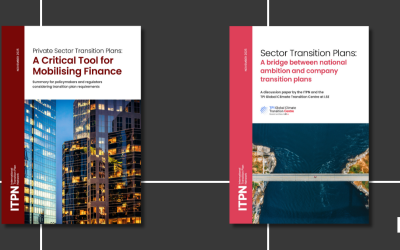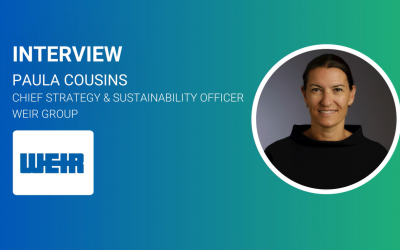David Bryson on how hydrogen will play a pivotal role in the transformation of Uniper
After the Hydrogen Transition Summit 2021, Climate Action caught up with David Bryson, Chief Operating Officer and Chief Sustainability Officer at Uniper, to discuss how hydrogen will play a pivotal role in the transformation of Uniper.

After the Hydrogen Transition Summit 2021, Climate Action caught up with David Bryson, Chief Operating Officer and Chief Sustainability Officer at Uniper, to discuss how hydrogen will play a pivotal role in the transformation of Uniper.
Can you give an overview of how hydrogen is being – or is going to be used – to decarbonise the economy through your organisation’s work?
Hydrogen will play a pivotal role in the transformation of Uniper. In the course of the next decade we want to invest more than 1 bn € into the growth of Uniper’s hydrogen business – production, storage, trading and optimisation – this is where our expertise lies.
Our hydrogen projects will undoubtedly support the decarbonisation of our economy:
- For Project Air (Sweden), a large variety of recovered end-of-life streams and hydrogen from electrolysis will be used to produce sustainable methanol for the chemical sector.
- Our project in Maasvlakte (Netherlands) will enable the large-scale production of green hydrogen with the use of power generated by North Sea wind farms. This renewable hydrogen will then be used by the Rotterdam petrochemical industry.
- With "Green Wilhelmshaven", we plan to establish a German national hub for hydrogen. An import terminal for green ammonia, equipped with an "ammonia cracker" for producing green hydrogen, and a 410-megawatt electrolysis plant are planned. The combination of these two facilities would be capable of supplying around 295,000 metric tons or 10% of the demand expected for the whole of Germany in 2030.
Can renewable and low carbon hydrogen really support the energy transition? What about their costs?
Various studies announce significant cost decreases in renewable and low-carbon hydrogen production. Renewable and low-carbon hydrogen could even break even with fossil based hydrogen in the late 2020s.
Such cost decreases are essential to make hydrogen a key success factor, especially in hard-to-abate sectors such as the steel industry, aviation and shipping industry, which face strong global competition.
However, there are a number pre-conditions to secure hydrogen cost decreases, including ramping-up renewables in high-yield sites around the globe, upscaling renewable and low-carbon hydrogen production capacity and establishing a renewable and low-carbon storage and transport infrastructure on- and offshore
A clear, reliable and pragmatic political framework, setting the rules and incentives to stimulate the large-scale production and long-term demand for hydrogen, could without a doubt help make renewable and low-carbon hydrogen competitive.
What legislative framework is needed at European Union’s level to support hydrogen deployment?
Tremendous efforts are needed to create an EU policy and regulatory framework that will support the ramp-up of hydrogen: from the need to strengthen the EU ETS, to the review the EU State Aid rules or the review of the Renewable Energy Directive.
However, I would like to focus more particularly on one very important aspect: the upcoming ‘Hydrogen and Gas Market Decarbonisation’ Package, planned by the European Commission for December 2021, which aims at reviewing the EU gas rules to facilitate the market entry of renewable and low-carbon gases.
It is critical that the package ensures that:
- All types of renewable and low-carbon hydrogen technologies are supported on a level playing field. This requires clear definitions for the different types of renewable and low-carbon gases, based on the carbon content.
- There is a fair allocation of costs among the hydrogen market players:
- The effective separation of networks from activities of production, supply and storage (unbundling rules) is fundamental.
- Hydrogen transport customers – mainly industry – should pay for the costs that arise from the construction and/or operation of a hydrogen transport network. Under no circumstances should costs be passed on to the natural gas network charges and to those customers for reasons of fairness.
Finally, I want to remind that without meaningful carbon price signals in all sectors of the economy globally, there will be no energy transition and no uptake of renewable and low-carbon hydrogen.
What nation/organisation do you think is leading the way – regarding the use of hydrogen – and what can you learn from this / emulate?
A few nations and organisations come to mind here:
First, the United Kingdom and its Hydrogen Strategy: this is a great signal for the industry as it sets out budgets and lays foundations for a number of support mechanisms such as a carbon contract for difference-esque mechanism to de-risk investments. I am particularly happy that the strategy acknowledges the role of low-carbon hydrogen and considers a wide variety of hydrogen applications, including in the heating sector. All renewable and low-carbon applications should indeed be explored and supported on a level playing field.
Second, the European Union and its ambitious 2x40GW Strategy but also its European Clean Hydrogen Alliance (ECH2A). I believe that the ECH2A is the right forum to define a meaningful investment agenda for hydrogen at EU level but also, whenever required, to flag obstacles and bottlenecks for the scaling up of hydrogen. For the ECH2A to be a success, cost efficiency, cost effectiveness and technological neutrality should be at the core of the discussions.
Third, Germany which embraces a new and unique international perspective with the H2 Global Initiative. H2 Global is indeed tasked with buying green hydrogen or hydrogen derivatives abroad and with re-selling these products at annual auctions. The purchases abroad are made on the basis of long-term contracts, thus giving businesses a secure basis for their planning and investment activities. I am glad to report that Uniper is one of the main supporters of this initiative and have been from the outset.
Uniper are speaking at the Hydrogen Transition Summit 2021, to join them register here now.






